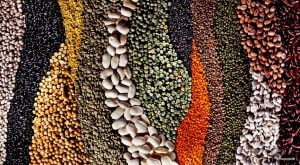Beetroot was first cultivated by the Romans. By the 19th century it held great commercial value when it was discovered that beets could be converted into sugar. Belonging to the same family as chard and spinach, both the leaves and root can be eaten – the leaves have a bitter taste whereas the round root is sweet. Typically a rich purple colour, beetroot can also be white or golden. Due to its high sugar content, beetroot is delicious eaten raw but is more typically cooked or pickled. Beetroot is of exceptional nutritional value; especially the greens, which are rich in calcium, iron and vitamins A and C. Beetroots are an excellent source of folic acid and a very good source of fibre, manganese and potassium. Beetroots have long been used for medicinal purposes, primarily for disorders of the liver as they help to stimulate the liver’s detoxification processes. The plant pigment that gives beetroot its rich, purple-crimson colour is betacyanin; a powerful agent, thought to suppress the development of some types of cancer.
Beetroot, also known simply as the beet, has been gaining in popularity as a new super food due to recent studies claiming that beets and beetroot juice can improve athletic performance, lower blood pressure and increase blood flow. New products incorporating this highly nutritious food are sprouting up everywhere, especially in juices and drinks. Beetroot, or table beets, although from the same family as sugar beets (beta vulgaris), are genetically and nutritionally different. Sugar beets are white in color and commonly used for sugar extraction and sweetening manufactured foods. Sugar cannot be obtained from beetroot, which are most commonly found in red and gold varieties.
Beetroot is rich in fibre, exerting favourable effects on bowel function, which may assist in preventing constipation and help to lower cholesterol levels too. Beetroot fibre has been shown to increase the level of antioxidant enzymes in the body, (specifically one called glutathione peroxidase), as well as increase the number of white blood cells, which are responsible for detecting and eliminating abnormal cells. Beets are also one of the richest sources of glutamine, an amino acid, essential to the health and maintenance of the intestinal tract.
Other studies have looked at the effect of beetroot juice on blood pressure. A reduction in blood pressure is beneficial for the avoidance of heart disease and stroke. Studies state that nitrate rich foods like beetroot may help in heart attack survival.
Consuming fruits and vegetables of all kinds has long been associated with a reduced risk of many lifestyle-related health conditions. Many studies have suggested that increasing consumption of plant foods like beetroot decreases the risk of obesity and overall mortality, diabetes, heart disease and promotes a healthy complexion and hair, increased energy, overall lower weight.
Drinking juice from beetroot can improve oxygenation to the brain, slowing the progression of dementia in older adults. Beets contain an antioxidant known as alpha-lipoic acid, which has been shown to lower glucose levels, increase insulin sensitivity and prevent oxidative stress-induced changes in patients with diabetes. Because of its high fiber content, beetroot helps to prevent constipation and promote regularity for a healthy digestive tract. Choline is a very important and versatile nutrient in beetroot that helps with sleep, muscle movement, learning and memory. Choline also helps to maintain the structure of cellular membranes, aids in the transmission of nerve impulses, assists in the absorption of fat and reduces chronic inflammation.
Beetroot juice supplementation has been shown to improve muscle oxygenation during exercise, suggesting that increased dietary nitrate intake has the potential to enhance exercise tolerance during long-term endurance exercise. Quality of life for those with cardiovascular, respiratory, or metabolic diseases, who find the activities of daily living physically difficult because of lack of oxygenation, could be improved.
Good quality, fresh beetroots should have their greens intact. The greens should be fresh-looking with no signs of spoilage. The beetroot should be firm, smooth, and a vibrant red-purple, not soft, wrinkled or dull in colour. Fresh beets with the greens attached can be stored for three to four days in the fridge, but beets with the greens removed can be stored in the fridge for two to four weeks. Raw beets do not freeze well since they tend to become soft on thawing. Freezing cooked beetroot is fine as it retains its flavour and texture.
written by.
Wahab Ali Khan, Muhammad Saeed and Iqra Yasmin
National Institute of Food Science & Technology, University of Agriculture Faisalabad.








